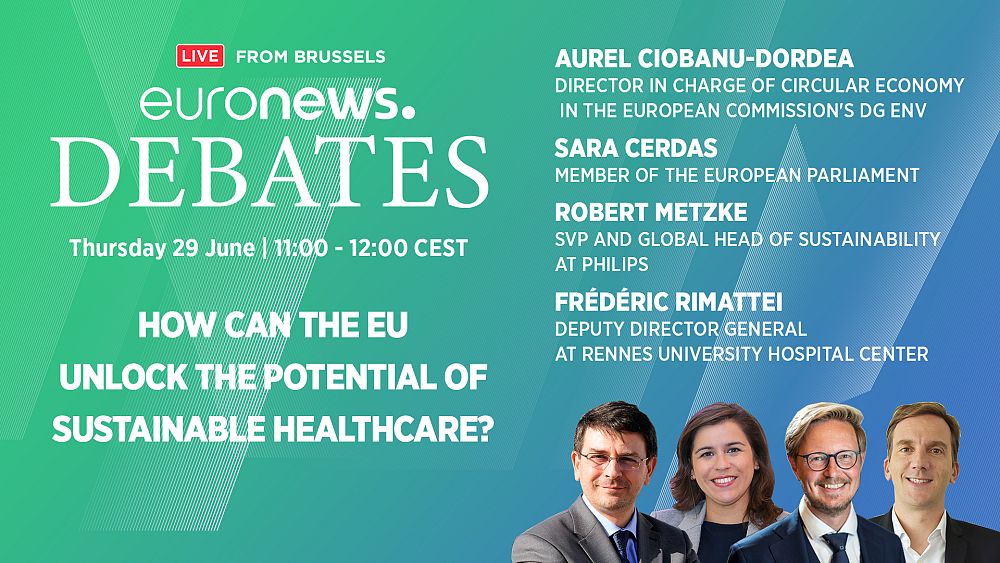How can the EU unlock the potential of sustainable healthcare?

Healthcare might not be the first industry that springs to mind when you consider the causes of the climate crisis. But with material extraction, supply, and the manufacture of equipment accounting for 40 to 50 per cent of global CO2 emissions, waste within the medical industry is playing a significant role in driving greenhouse gas emissions (GHGs).
If the world is to meet the targets set out in the Paris Agreement, the healtcare sector needs to transition to a circular economy. This means finding new and sustainable ways to use resources to bring about the decarbonisation of the industry.
Many solutions already exist to close the loop and make healthcare a more circular economy, with multinationals like Philips working hard to offer innovative solutions such as equipment recycling.
The European Union is leading the way too, with several initiatives following on the backs of the European Green Deal and the Circular Economy Action Plan (CEAP).
But with healthcare funding in Europe already stretched, can the EU transition to a circular economy without compromising on quality and patient safety?
And as we move towards a more digital future, could money and resources be saved by making healthcare more digital?
To discuss all these issues and more, join the Euronews Debate team live on June 29th at 11 am (CEST) as we discuss these questions with our expert panel.
Register now:
Meet our panel
Aurel Ciobanu-Dordea, Director in charge of the Circular Economy in the European Commission’s DG ENV
Aurel Ciobanu-Dordea is the Director in charge of the Circular Economy in the European Commission’s Directorate-General for Environment.
Between 2014 and 2022 he worked as the Director in charge of Enforcement, Cohesion and the European Semester in the same DG. Prior to that, he was the Director for Equality in the Directorate-General for Justice, in charge of equality and the fight against discrimination. He joined the European Commission in 2009.
Robert Metzke, SVP and Global Head of Sustainability at Philips
Robert Metzke leads Philips’ activities in sustainability and drives the company’s strategy towards innovation. He implements sustainable business models and embeds sustainable and circular ways of working across Philips.
Robert and his team lead all activities with regard to Philips’ environmental responsibility, with a focus on climate action, circular economy and expanding access to healthcare in underserved communities, as part of Philips’ overall purpose to improve people’s health and well-being.
MEP Sara Cerdas
Sara Cerdas is a Portuguese medical doctor and a Member of the European Parliament. She is a member of the Committee on the Environment, Public Health and Food Safety (ENVI), the Committee on Transport and Tourism (TRAN) and S&D coordinator of the Special Committee on COVID-19 (COVI) and the Sub-Committee on Public Health (SANT).
Cerdas was also vice-president of the Special Committee on Beating Cancer (BECA). Currently, MEP Cerdas is shadow rapporteur of the proposal for Regulation for the European Health Data Space.
Frédéric Rimattei, Deputy Director General at Rennes University Hospital Center
After holding various management positions in major university hospitals in France (Montpellier, Toulouse), Frédéric Rimattei was appointed Deputy Director General of the Rennes University Hospital in 2015. In this capacity, he supervises the implementation of the CHU’s research and innovation policy as well as sustainability, in close collaboration with all of the establishment’s scientific, academic and industrial partners.
A major focus of the CHU’s research and innovation strategy, health technologies and sustainability are at the heart of the considerable investments made by the CHU, in particular within the framework of the #NouveauCHUdeRennes project.
Jeremy Wilks, Euronews Reporter and debate moderator
Euronews science reporter Jeremy Wilks covers everything from climate change to healthcare innovation. He has reported on science research, innovation and digital technology across Europe for over a decade. He regularly hosts live debates both on Euronews digital platforms and at large conference events. Jeremy is the presenter of the monthly Climate Now series on Euronews.
If you would like to submit a question for our panel please use the form below:
How much waste is generated by the healthcare sector in the EU?
According to the World Health Organisation (WHO), around 85 per cent of all waste generated by healthcare activities globally is non-hazardous. This leaves 15 per of waste which is considered hazardous to human health, because it is either infectious, toxic or radioactive.
While many healthcare products, such as needles, bandages and other types of clinical waste cannot be reused, many items of electronic equipment can, and thanks to advances in technology, the lifecycles of equipment and installed systems can be extended too. Refurbishment is often the most sustainable way to upgrade and extend the lifecycle of products, but as technology advances, new products are sometimes needed.
Purchasing eco-designed products is also a great way for healthcare companies to cut their carbon footprint, as they are generally more energy and resource efficient and have been designed so that they can be repaired instead of replaced.
Are healthcare products recyclable?
When products have reached the end of their life, responsible recycling is the best way to reduce their impact.
The Waste Electrical and Electronic Equipment Directive (WEEE Directive) introduced by the EU in 2003, states that the original producer has responsibility for recycling. The Individual Producer Responsibility (IPR) places end-of-life responsibility on producers, importers and brand owners, to ensure that product waste is recovered and reused.
While many brands are on board with a circular economy, more innovation is needed to prevent waste across the lifecycle of electronic products. The StEP Initiative (Solving the E-waste Problem) founded in 2003, with members including Philips and Microsoft, aims to standardise the recycling process, so that valuable components can be easily removed from waste products.
Many healthcare products also come with recycling passports, so that they can be disassembled and recycled safely and appropriately. This is particularly important with products that may contain hazardous materials or valuable components that can be reused.
Is digitisation the future of healthcare?
While expensive medical equipment will always have its place in the healthcare sector, increasing digitisation may also reduce the carbon footprint of medicine and make it more sustainable.
Virtual resources, digital tools and software may also enable healthcare settings to ‘dematerialize’ too. Innovations such as telehealth, where patients have virtual meetings with doctors will cut down on CO2 emissions from travel, while cloud-based services and efficiency-enhancing software could reduce CO2 emissions from computing and data storage.
While technology and recycling methods are improving, with so many problems to solve, from funding crises to an ageing population, can healthcare become more sustainable without reducing quality and safety? Join us on June 29th at 11 am (CEST) to find out what are our experts think.
Source: Euro News














